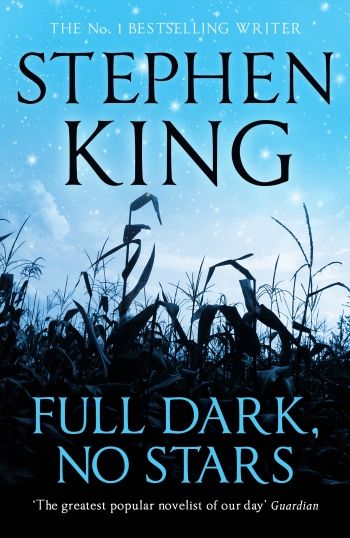Why you can trust GamesRadar+
A quartet of short sharp shocks
Page counts can be deceptive. In the wake of the massive, doorstop-sized epic that was Under The Dome , it’d be easy for some Stephen King fans to look at his latest, unusually thin story collection (running for only 340 pages) and ask: “Is that it?” Even previous quartets of short novels like Different Seasons and Four Past Midnight were at least twice the length of Full Dark, No Stars . Despite this, there’s no need to worry about being potentially short-changed.
In fact, King has kept this collection brief for a very specific reason. These are harsh, bleak stories, hitting such a deliberately dark and disturbing tone that any longer than 340 pages would simply feel excessive. We don’t even get much comfortable supernatural weirdness, as aside from the story “Fair Extension” (the shortest in the collection) King largely focuses on real-world horrors, taking a firm look at human nature and rarely liking what he finds.
He also takes on some traditional horror staples here, but each tale finds new twists, angles or themes to explore in what initially seems like well-trodden territory. In the case of the first (and biggest) story, “1922”, King produces a quietly insidious saga of a man undone by greed and guilt, as a Nebraska farmer’s clash with his wife over a land sale pushes both him and his teenage son in a terrible direction. A tragic portrait of America in the Twenties, “1922” is gently paced and yet grips like a vice, homaging the slow-burning menace of HP Lovecraft while also featuring plenty of viciously nasty shocks.
Even darker is “Fair Extension”, which starts out as King’s take on the Faust story, as a cancer-ridden man is offered a chance to turn his life around, so long as he nominates someone else to receive his bad luck. All the stories in Full Dark, No Stars explore the idea of retribution, but “Fair Extension” is the bleakest of the lot, exploring how petty differences can spiral into horrible consequences, and showing the pleasure some people get from the misfortunes of others.
There’s an equal split between male and female stories here, and both the remaining novellas find different ways of putting well-meaning, innocent women through major trauma. “Big Driver” sees a female writer of cozy mystery novels undergo a horrific attack after taking a late-night shortcut, and puts us firmly into her psyche as she tries to deal with the aftermath. The eventual shift to revenge pitches this more into traditional thriller territory, but it’s all sharply executed and never less than compulsive reading. “A Good Marriage” takes a very different tack for its main character. Here, we get a portrait of a long-running, happy marriage that’s suddenly derailed when Darcy Anderson makes an unexpected discovery that casts everything she thinks she knows about her husband into a different light. Again, it’s less about the details of the plot than the way King builds the emotional life of the characters, with the story packing a considerable punch as it heads towards a powerful, affecting climax.
Even with the shortage of supernatural shenanigans, there’s still enough visceral impact to keep any self-respecting horror fans happy (especially in “1922”, thanks to some skin-crawlingly horrible sequences involving rats). Full Dark, No Stars is a long way from being a comfortable or reassuring read, but it does once again prove that in the world of horror literature, Stephen King is still a force to be reckoned with.
Saxon Bullock
Ian Berriman has been working for SFX – the world's leading sci-fi, fantasy and horror magazine – since March 2002. He's also a regular writer for Electronic Sound. Other publications he's contributed to include Total Film, When Saturday Comes, Retro Pop, Horrorville, and What DVD. A life-long Doctor Who fan, he's also a supporter of Hull City, and live-tweets along to BBC Four's Top Of The Pops repeats from his @TOTPFacts account.



